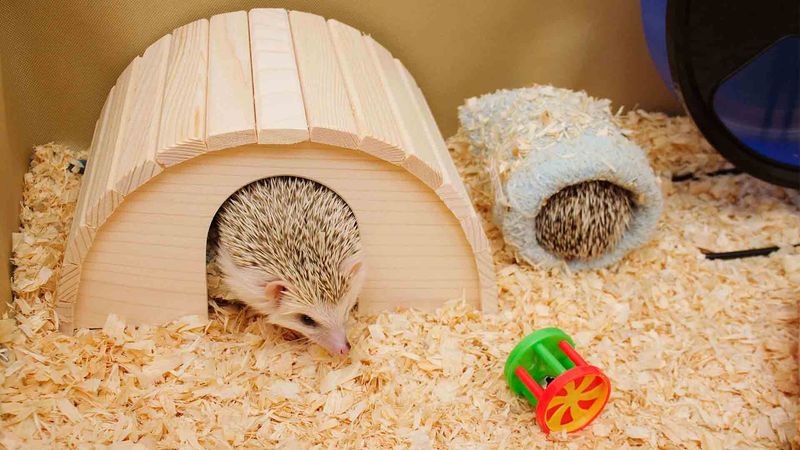📖 Table of Content:
Bringing a pet hedgehog into your life is an exciting and unique experience that’s unlike caring for more traditional pets. These tiny, spiky creatures captivate animal lovers with their quirky behaviors, adorable faces, and distinct personalities.
However, owning a hedgehog is not as simple as it might seem. These nocturnal animals come with specific needs and responsibilities that require careful consideration before bringing one home.
Hedgehogs are also not the most conventional cuddle companions—they require patience and gentle handling to build trust and bond with their human caregivers. Beyond their care requirements, it’s essential to understand their natural behaviors and potential health concerns.
Taking the time to prepare yourself with the right knowledge not only ensures a better life for your hedgehog but also helps you decide if this exotic pet truly fits your lifestyle.
1. Hedgehog Housing
Creating the perfect home for your hedgehog is crucial for their health and happiness. Hedgehogs require a spacious cage that allows them to move around freely. The ideal size is at least 4 square feet.
Ensure the cage has proper ventilation and is escape-proof, as these little creatures are known for their curiosity and exploration.
Inside, provide soft bedding, like fleece or paper, avoiding wood shavings that can harm their skin. Include hiding spots and tunnels to simulate their natural environment, giving them a sense of security.
Don’t forget a solid wheel for exercise, as hedgehogs are active and need daily physical activity. Keep the cage clean to prevent odors and health issues. Remember, a well-maintained home is the first step to a happy hedgehog.
2. Dietary Needs
Feeding your hedgehog a balanced diet is vital for their well-being. Hedgehogs are insectivores, so their primary diet should consist of high-quality hedgehog food supplemented with insects. Mealworms and crickets are excellent choices to provide protein.
Fresh fruits and vegetables can be offered in small amounts to add variety. Avoid citrus fruits and those high in sugar or acidity, which can upset their stomach. Always provide fresh, clean water and ensure food is free from additives and artificial ingredients.
Monitoring your hedgehog’s weight is important, as obesity can lead to health problems. Adjust their diet as needed, keeping them lean and active. With proper nutrition, your hedgehog can lead a long, healthy life.
3. Handling and Socialization
Handling your hedgehog with care is essential to building trust and a strong bond. Hedgehogs are naturally shy and can take time to warm up to human interaction. Start by slowly introducing your hand into their space, allowing them to sniff and become accustomed to your scent.
Once they seem comfortable, gently scoop them up, supporting their belly and legs. Be patient, as sudden movements can frighten them, causing them to curl into a ball.
Regular handling helps your hedgehog become more social and less fearful. Spend time with them daily to strengthen your relationship, ensuring they feel safe and loved. Remember, patience and gentle handling are key to a happy, social hedgehog.
4. Health and Veterinary Care
Regular veterinary care is crucial for maintaining your hedgehog’s health. It’s important to find a vet experienced with exotic pets, as hedgehogs have specific needs. Regular check-ups can help detect issues early, ensuring a healthy life.
Watch for signs of illness, such as lethargy, loss of appetite, or changes in behavior. Hedgehogs can suffer from common ailments like mites, respiratory infections, and dental problems. Catching these early can make treatment more effective.
Additionally, maintaining a clean habitat and proper diet contributes to your hedgehog’s overall health. Regular health checks and a good relationship with your vet can prevent serious issues, offering peace of mind for both you and your pet.
5. Temperature and Environment
Maintaining the right temperature is vital for a hedgehog’s well-being. Hedgehogs are sensitive to temperature changes and require a stable environment. The ideal temperature range is between 72-80 degrees Fahrenheit.
Use a thermostat-controlled heat source to ensure a consistent temperature. Avoid placing the cage in drafty or excessively warm areas, as drastic changes can stress your pet.
Providing a cozy sleeping area with soft blankets can help regulate their body temperature. Monitor environmental conditions closely, adjusting as needed to keep them comfortable.
A stable, warm environment is essential for preventing hibernation attempts, which can be dangerous for domesticated hedgehogs.
6. Behavior and Personality
Understanding your hedgehog’s behavior and personality is key to a successful pet-owner relationship. Hedgehogs are naturally solitary and can be timid around new people or environments.
Each hedgehog has a unique personality, some being more social while others are reserved. Spending time observing their behavior can help you understand their needs and preferences.
Recognizing signs of stress or discomfort, such as hissing or curling up, can help you adjust your handling or environment to suit them better. Patience and respect for their individuality will go a long way in ensuring a happy and content pet.
7. Legal Considerations
Before bringing a hedgehog home, it’s important to understand the legal requirements and restrictions in your area. Hedgehogs are considered exotic pets, and some regions have specific regulations regarding their ownership.
Research local laws to determine if you need permits or licenses. Some areas may have outright bans on hedgehog ownership. Understanding these legal aspects ahead of time can prevent future complications.
Additionally, ethical considerations should be taken into account, ensuring that your hedgehog is sourced from reputable breeders and not from illegal or unethical origins. Being informed and prepared will help you provide a safe and legal home for your pet.
8. Time Commitment
Owning a hedgehog requires a significant time commitment. While they are relatively low-maintenance compared to some pets, they still need daily interaction and care.
Plan to spend time each day feeding, cleaning, and interacting with your hedgehog. Regular playtime helps them stay active and social, preventing boredom and loneliness.
Consider your schedule and lifestyle to ensure you can provide the necessary attention and care. A well-cared-for hedgehog is a happy one, and your dedication will be rewarded with a playful and affectionate pet.
9. Cost of Ownership
Owning a hedgehog involves financial responsibilities. Initial costs include purchasing the hedgehog, setting up their habitat, and acquiring necessary supplies.
Ongoing expenses consist of food, bedding, and regular veterinary care. Unexpected medical bills can arise, so having a financial cushion is wise.
Researching and budgeting for these costs will help you prepare for the financial commitment. Understanding the expenses involved ensures you can provide a stable and loving home for your pet without financial strain.
10. Lifespan and Lifecare
Hedgehogs have a lifespan of 3-7 years, making it important to plan for long-term care. Regular health checks and proper diet contribute to their longevity.
Understanding the commitment involved helps you provide a nurturing environment throughout their life. Being attentive to their needs and recognizing signs of aging can ensure they remain healthy and comfortable.
Prepare for their senior years by maintaining a strong relationship with your vet and adapting care routines as needed. With proper care and attention, your hedgehog can enjoy a long, fulfilling life as part of your family.










